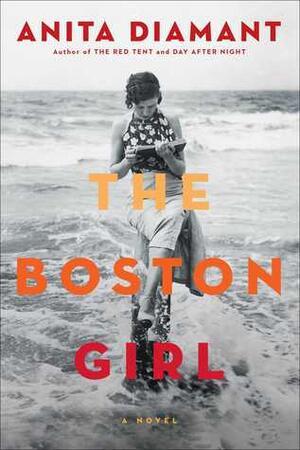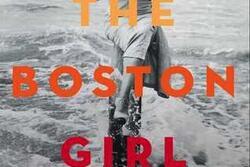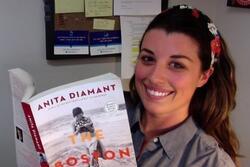Q&A with Anita Diamant
Welcome to the JWA Book Club! We are excited to gather today to discuss Anita Diamant's new novel, The Boston Girl.
When taking part in our comment-based discussion below, remember to hit "Show Reply" and "Show New Comments" to see the full conversation! Anita Diamant will be responding to questions mainly through the "reply" feature.







Thank you, Tara, for organizing this discussion, and thank you, Anita, for giving us your time. To everyone, a huge "thank you" for sharing your thoughts!
In reply to <p>Thank you, Tara, for by MiriamEichler
Thank YOU, Miriam!
Thank you everyone for participating in our first online Book Club meeting, especially Anita Diamant! It was a joy, and we can't wait to see you next month.
What about Addie's father? I so get that after the one grandson died -- that he was afraid to love/attach to the future again in such an intimate way? He chose to attach to the bnei mitzvah as his way to connect to the future -- a far safer way.
This was my first experience with ANY book club, not just an online book club. Thanks for starting this!
I thank everyone for a fascinating look at Jewish Women's history in the early 20th Century. I can't wait to do more research.
I also LOVED the role of female friendship in this book. The peer networks were so important to Addie (as were the mentors, of course). As a historian and as a woman who relies on my women friends, this part of the story felt so true and important.
As we wrap up here, I want to let everyone here know about a special upcoming event: If you live in the NY area and want another opportunity to engage with Anita Diamant, JWA is co-sponsoring an event called "Women of the Book" with the Jewish Book Council at 6:30 on Tuesday, March 24 at the Jewish Museum. The event is the second in an exciting new series from the Jewish Book Council that brings together some of the finest writers of the day for conversations around contemporary Jewish life and identity. A panel of writers, including Anita Diamant, Elisa Albert, and Ruth Andrew Ellenson, will discuss their recent works and what it has meant to be a Jewish woman writer over the past several decades. The evening is free and and includes wine and refreshments, a book sale and signing, and the opportunity to visit The Jewish Museum galleries. Guests must pre-register. We'd love to see you there!
In reply to <p>As we wrap up here, I want by Tara M.
Thank you Tara and everyone who participated. It was an honor
One of the things I was struck by is the role of family in this book. I think sometimes we tend to be nostalgic about the immigrant family as this tight structure, but for the most part, Addie feels like a figure who had to break free from her family to get what she wanted/needed and didn't get much support from them (except some from Betty). Her independence is really striking.
In reply to <p>One of the things I was by Judith Rosenbaum
Amen to that. I am anti-nostalgia. Lots of children of immigrants fled their families, despite the "we all lived on the same block" fantasy.
Gotta run, but thank you Anita, Tara, Judith and all of you on line. this was absolutely Terrific!
In reply to <p>Gotta run, but thank you by sukir49md
Thank you for coming!!
In reply to <p>Gotta run, but thank you by sukir49md
thanks to you too
The specifics about what was not so great about Addie's husband stuck with me.
From Virginia A. Spatz:
(I thought there was going to be a question to being discussion here, but I see none. So, I'll just start...) The video posted here says Diamant wrote this book about the Rockport Lodge and how that expanded Addie Baum's view of the world and friendships for life. But I am wondering if it was written with some sort of social studies curriculum in mind: The book touches on major historical points -- immigration challenges and assimilation, health issues and shell-shock, oppression of women and labor issues, German versus other Ashkenazi Jewish observances, and white/Jewish flight from cities -- without presenting anything too challenging. In fact, it strikes me as very like an "American Girl" story for slightly older readers, i.e., really just mean to illustrate a time period, not to tell a particularly character-focused story.
The most interesting thing to me was Addie's discovering the anti-child-labor movement when she meets her soon-to-be-husband and how problematic that must have been for someone whose family survival depended on funds from the garment industry. Prior to that we hear very little about conditions and struggles in the factory, especially as Addie and her sister work in offices. But this is tossed off, as "yeah, I thought about my brother-in-law's company," but it's not posed as any kind of conflict in the family: Wasn't Levine upset to have a brother-in-law who was threatening his livelihood and the industry? There must have been some tension there, but it's not explored in the interview with the granddaughter. So, if Anita Diamant is to respond: I'd really like to know about this choice to glide right by what I'm guessing would have been at least as worthy of comment as the issue about which shul to join?
Perhaps because we only have what Addie told her granddaughter, we get only the most obvious (and understandable) anger: lack of recognition for women in the early part of the 20th Century, struggles in the newsroom, racial policies that kept some stories only in the Nation. What would the story have been like, had she been speaking to a peer? to someone in the labor movement? to a young organizer?
In reply to <p>From Virginia A. Spatz:</p by Tara M.
The overarching answer to your questions is that this was written as a novel -- a rather intimate novel at that -- about one woman's life. And in many ways, an "ordinary" woman. No Nobel prize, no street named after her. And I did choose to tell it through her eyes and in a way that she could comfortably tell it to a granddaughter. That limits the scope of the story. As a novel, rather than a history, there was no thought of "curriculum." I knew I was leaving out a great deal -- your listed many of the issues and questions raised by writing about this period. My choices were aesthetic.
have to run. this was fun. thanks.
In reply to <p>have to run. this was fun by Ricki Henschel
thanks Ricki!
I thought the granddaughter becoming a Rabbi was a great ending. And don't let anyone tell you things are not better.
In reply to <p>I thought the by srsilverjd
Interesting point. I know so many women who are rabbis (I'm in my late 20s) or studying to become rabbis, so I was like "okay" when I read this. But after reflecting and seeing some of the comments/discussion today, it reminds me how important it is to have a legacy of change. It is important to know the stories, but it is funny how sometimes, even when we don't know that our older relatives or friends were traiblazers, we feel pulled towards changing and shaping our own lives/world. It is powerful to see how the "chutzpah" gene is transmitted, if you will!
In reply to <p>Interesting point. I know by Etta King
we take it so for granted that women are rabbis. for Addie it would be stupendous proof that "things get better"
In reply to <p>I thought the by srsilverjd
Good point....I am of the generation that gave us a few dozen of our first 20th c. women rabbis, including Rabbi Sally Priesand. I once thought about training for the rabbinate, but was advised by a rabbinical student (male) that the first female rabbis would have to be very tough. It is interesting that Ava, in her generation, will not have to struggle to be accepted in what had been considered a man's world. We really do not know that much about her character.
Tara: Will these comments remain here for us to access after the session. Some of them might lead to good questions for our book clubs.
In reply to <p>Tara: Will these comments by MiriamEichler
yes! they certainly will.
It was really fun reading this book about the city I live in. Were there aspects of this immigrant history that you think are unique to Boston, or do you think Addie's story would have played out similarly in any other northeastern city?
In reply to <p>It was really fun reading by Judith Rosenbaum
Ooh, good question!
In reply to <p>It was really fun reading by Judith Rosenbaum
I think it's a Boston-inflected story, but it could play out elsewhere. I've gotten comments from New Yorkers, of course, but also from a midwestern woman with a grandmother who came from Sweden!
In reply to <p>It was really fun reading by Judith Rosenbaum
Judith: I think it might have been set in NYC, assuming that the Simmons component could be placed at Barnard (not sure). While there is no "North End", the immigrant populations here were diverse and certainly included Italians, Irish, and Jews. We have the "Lower East Side" and East Harlem, where my maternal grandparents and children lived, as well as the Bronx, where my father's family lived.
Anita, has this book given you ideas for a sequel or for your next book? In the future, of course.
In reply to <p>Anita, has this book given by IlanaB
No sequels for me.
As someone who has studied the birth control movement in this period and Jewish women's involvement in it, I was particularly interested in the scene of the self-induced abortion, which I found so powerful. Anita, can you share a bit about your research and/or thinking for that story line?
In reply to <p>As someone who has studied by Judith Rosenbaum
I read a fair amount about Margaret Sanger, including the notorious pamphlet about birth control she wrote. Women were at such risk in this regard.
Sorry to say that I must run. Enjoyed this, and will check back later to see how the rest of the discussion unfolds. Thank you, Anita, for a terrific book, and thanks, JWA, for this chat!
In reply to <p>Sorry to say that I must by Erika Dreifus
thanks for coming!
In reply to <p>Sorry to say that I must by Erika Dreifus
thanks to you
Anita, what do you think you learned from writing this book that impacted your life today?
In reply to <p>Anita, what do you think by Ricki Henschel
I was struck by the theme of life turning out differently that one may plan for or expect--Addie never planned on being a journalist or social worker. A very relevant lesson for life today...
In reply to <p>I was struck by the theme by Tara M.
I didn't plan on being a journalist or a novelist.
In reply to <p>Anita, what do you think by Ricki Henschel
One thing that struck me: how many mentors I have been fortunate to have in my life. Teachers, counselors, and friends, too. Mentors can be younger than you as well as older.
Anita, did you have a target audience in mind when you wrote this book? (I am evidently older than many of the participants in this discussion, as I am already a grandmother. I can no longer interview either of my grandmothers or my mother, but my mom did tell me much about her childhood.) Have you any demographics about who is reading The Boston Girl? Ages? Any men? More people in the Boston area than elsewhere? More who are Jewish?
In reply to <p>Anita, did you have a by MiriamEichler
you are not alone--also a grandmother...
In reply to <p>Anita, did you have a by MiriamEichler
I am a grandmother in a book club of all grandmothers, and we are reading the book and everyone is loving it.
In reply to <p>Anita, did you have a by MiriamEichler
No demographics but I can assure you it's overwhelmingly a female readership. As for age, I have heard from grandmothers who have given it to granddaughters, and granddaughters who have given it to grandmothers. Some for Christmas!
In reply to <p>No demographics but I can by Anita Diamant
Our "Brandeis National Committee" Lit Ladies group (Middlesex Co. NJ) will be reading The Boston Girl some time in the coming year. We are all either old enough to be parents or grandparents.
In reply to <p>Anita, did you have a by MiriamEichler
Old enough to be a grandmother, but... not yet.
In reply to <p>Anita, did you have a by MiriamEichler
Miriam, I love your question. I realize that for me, having lived in the Boston area for many years (though not living there currently), much of the pleasure I had reading this book came from recognizing/being able to visualize so many of the settings (and yet learning more about them).
In reply to <p>Miriam, I love your by Erika Dreifus
Thank you, Erika....While I have never lived in the Boston area, my husband and I visited it several times, especially when our daughter was at Brandeis. I was able to visualize some of the settings, but not all.
In reply to <p>Miriam, I love your by Erika Dreifus
Ditto, Erika. Used to live in Boston and loved identifying with the settings as well.
The relationships between Mameh and each of the 3 daughters were so different and so complex. It is so hard for me to understand how a mother can treat her daughters SO differently. Not to mention the destruction of self-esteem that was so present in the home.